- Home
- L. R. Patton
The Treacherous Secret Page 9
The Treacherous Secret Read online
Page 9
And so this is why we find Sir Greyson in the king’s throne room, asking once more whether this is what the king wishes to do. For perhaps the king might yet be persuaded to change his mind, having slept on the news of a magical child.
Sir Greyson, on the other hand, knows that what the king asks of him is not right. Last eve he walked the streets of Fairendale in the dark of night, when everything was still and quiet and only the wind talked. And what it whispered to him was, No. No, no, no.
But Sir Greyson arrived at his mother’s cottage, and she was already in bed, her face white, her hair sticking to her neck and forehead. Her legs were swollen so that when Sir Greyson touched them, his fingers left impressions. He gave her a shot while she slept. She hardly stirred.
She was growing worse. He would need stronger medicine.
So what does a man like Sir Greyson do?
The king is cheerful this morning. He has grand plans for what is going to happen now. Raid the village, in just a few hours, capture all the children, find the one who might steal a throne. The people, of course, will do their duty to the king, for they love and respect and fear him. They revere him. They obey him.
Sir Greyson, however, is not so sure, and that is why his men will wear armor today rather than walk into the village with bare chests and necks and heads.
“Sire,” Sir Greyson says. “Are you sure we need all the children? Are you sure we do not need only the children of a certain age group?” Say, ten or eleven or twelve years old? Sir Greyson does not mean to offend his king. So this last bit he keeps for himself.
King Willis licks his fingers. He is eating, of course. A plate of sweet rolls sits on his belly, since he is a man who no longer has a lap. “Yes, Captain,” King Willis says. “I am sure.”
“What do we do with their parents, sire?” Sir Greyson says. He does not know if King Willis has thought about what the parents of the village children will do.
“Slay them if they resist,” King Willis says.
“But they will all resist,” Sir Greyson says. “They love their children.”
“Surely they do not all love their children more than they love obedience to their king,” King Willis says. “Surely they do not love their children enough to die by the sword.” Sir Greyson is not so sure. “And if they do...” The king looks at Sir Greyson. His eyes narrow in his fat face. The cheeks pull up into a smile, like red balls of fluff poking out from a face. “They shall pay dearly for it.”
Sir Greyson feels the sickness in his stomach, but he has not been dismissed. So he stands and waits for the king’s dismissal. He must watch the king eat three more sweet rolls, stuffing them in his mouth with hardly a chew, before it comes.
“Go,” the king says. “Ready your men. It will be dusk soon.”
“Yes, sire,” Sir Greyson says, and he turns on his heel and retreats to his men.
His mother. What will his mother say when she discovers what he has done?
IT is not night, but the day is black all the same. The clouds have rolled in thick and final, as if they know, too, what is to come. Arthur watches them, urging his family to pack faster.
“We must go,” he says. “We must leave. Now.”
Thunder claps. Lightning flashes on top of thunder.
Maude stares at the sky out the window, at the wind puffing dust in the streets so it is hard to see one house from another. No one moves out of doors. “We will have to wait,” she says. Good, practical Maude. She knows they cannot go on in a storm like this one.
“We cannot wait,” Arthur says. His voice has become loud, obstinate, raised in fear. “We cannot wait. We must go.” He turns to Theo and Hazel. “Children.”
Theo and Hazel each carry one bag stuffed with a change of clothes and some warm bread Maude made in the early morning hours. They will find other food on their way. Or so they all hope.
Hazel’s eyes are rimmed with red. She does not wish to leave her friends, but the villagers did not believe Arthur’s warnings when he stood in the courtyard earlier today and told them what would come. Not even Mercy will come with them.
Theo’s dark blues are wide with worry and regret.
If only he had not used his magic mistakenly. Flight could have been avoided. The lives of the village children would not be in danger.
I am sorry, his eyes say, though it is not Theo who needs to apologize. We know who is really at fault here.
“Let us go,” Arthur says.
Hazel catches his arm before he walks out the door. “What about the others?” she says. “We must convince them.”
Arthur shakes his head. “I have tried, my dear,” he says. “They do not listen.”
“You must try again,” she says.
“There is no time,” Arthur says. “We must flee without them.”
“You know what the king will do,” Maude says. “You know what will happen.”
She has felt Death waiting. He is colder than he ever was.
Arthur stares at his wife. He knows she will not go without this last little try, this thing that is not so very little. He will have to warn them again. He will have to shout above the wind’s howl and the thunder’s clap. He will have to make them listen this time.
He dips his head.
And then Arthur walks out into the streets, and the wind thrashes his face, and he shouts as loud as he can possibly shout. “Death is coming,” he says. “Run while you can.”
But the wind, you see, is too loud. The people cannot hear him. They see him in the street, and they come out of their houses and they stand in their doorways, watching, but his words are lost, drowned, stolen by the sound and fury of storm.
And this is why Arthur, Maude, Theo and Hazel stand in the middle of the village street, rather than running. This is why they cannot hear the explosion of a thousand hooves down the road between the village and its castle. This, dear reader, is precisely what destroys them.
When the first horse claps his hoof on the cobblestones of the village, the sky opens up.
DEATH waits. Only a few more moments and he will move. Not long now. He has been waiting for hours, but he does not have to wait forever. He will steal his first victim soon.
The first horse emerges from water and dirt and wind, and Death glides from his post.
There will be plenty. Oh, yes. There will be plenty today.
Banished
THERE came an evening when taking care of a little girl was not enough for Prince Wendell.
King Sebastien was supping with Prince Willis, for Prince Wendell and Clarion were nowhere to be found when Cook clanged the supper bell. King Sebastien asked questions about their whereabouts, and Prince Willis provided him with unsatisfactory answers, such as, “I do not know” and “He and Clarion went to see the villagers, perhaps,” and “Perhaps they went swimming in the cove,” and King Sebastien was not a man much given to mercy or mystery. A son late to supper was intolerable. He stormed out of the dining hall, with his youngest son following.
“Father,” Prince Willis said. “Father, please. He will be home soon.”
King Sebastien turned on his heel and glared at his son. “You know where they are,” he said, and it was not a question. Prince Willis drew back into shadows. King Sebastien pulled him roughly out.
“No,” Prince Willis said. “I do not know.”
“You do,” King Sebastien said. He did not roar. He did not shout. What he did was worse, perhaps. He said the words in a quiet voice, one full of steel and thorns and threat.
For a moment it appeared as though Prince Willis would refuse to take King Sebastien to his brother, for of course Prince Willis knew precisely where his brother was and what he was doing. They were friends and not merely brothers. Prince Willis was forever begging his brother not to visit the village. Prince Wendell was forever begging his brother not to tell.
But King Sebastien tugged violently on a tuft of curls at the nape of his son’s neck. He drew his son’s eyes to him. “Tell
me,” he said in that quiet, steely voice. “Tell me, or you will have worse done to you than I have ever done to your brother.”
Prince Willis was so overcome by fear that he could do nothing but point the way toward the village. King Sebastien did not have to guess at much beyond that.
But when he came upon Prince Wendell and Clarion, they were walking along the road back toward the castle. Clarion was holding Prince Wendell’s hand. They stopped when they saw King Sebastien on the bridge, Prince Willis several paces behind. Prince Wendell rushed forward, for even at this distance, he had seen his brother’s face. Moreover, he had seen his father’s face.
“Brother,” Prince Wendell said. “What has happened?”
Prince Willis only stared at his father, for he had no words to speak. Prince Wendell turned to his father.
“What have you done?” he said.
“The question is,” King Sebastien said, “what have you done?”
King Sebastien did not miss the look between Prince Wendell and Prince Willis, for he was an observant man when it came to wrongdoing. He could spot treachery. He did not miss, either, the way Clarion stared up at Prince Wendell, as if asking how much she should tell this man. Well. There was his way. He would get the child alone, and she would tell all. She would tell all simply because she was a child. “We were visiting our people,” Prince Wendell said. “They deserve to see their future king and queen every now and again. Is that not so, Clary?”
Clarion nodded. “We were visiting,” she said, though King Sebastien could see the lie her eyes held. She was not so very hard to read, after all.
But once he got her alone, he would discover the truth.
Later that night, King Sebastien stole into the girl’s room, though he had never crossed the threshold before. She startled and then bowed her head.
“My king,” she said.
“I only wanted to say goodnight,” he said. He stood at the foot of her bed.
“Is Wendell coming?” she said. “He usually tells me stories.”
“What kinds of stories does Wendell tell you?” King Sebastien said. The child looked small in the enormous bed, white-skinned against the red of her bedcovers.
“Stories of good kings,” Clarion said. “Good kings who take care of their people.” Her face grew troubled. “You do not take care of your people.” She looked stricken for a moment, as though her own words surprised her. Perhaps she had not meant to say them aloud.
“Is that what Wendell tells you?” King Sebastien said.
“Oh, no,” Clarion said. “He only says good things about his father.” She looked away for a moment and then back at him. “But the people are always hungry. A good king should feed his people.”
“Perhaps that is something only a bad king would do,” King Sebastien said.
“But people should not go hungry—”
“Hush, my child,” King Sebastien said. He sat at the foot of her bed. “Wendell is not coming tonight. I will tell you a story in his place. But first you must tell me a story.”
“But I do not know any stories,” Clarion said. “I do not know how to tell them as Wendell does.”
King Sebastien looked at her golden hair and then back at her face. “You do not have to make it up. You can tell me something that is the truth.”
She tilted her head at him, and he could see the indecision warring between her brows. Should she tell? Should she keep what she carried a secret? He made his move in this elaborate game.
“Tell me a story about what you and Wendell were doing in the village,” King Sebastien said.
The girl hesitated.
“We shall pretend you are telling a story,” King Sebastien said. “I will not know whether you are telling the truth or using your imagination.”
But he would know. Of course he would. She was only a child, after all.
The girl nodded.
It was so easy.
She told him of the village houses and the people they visited, one after another, and the clothes they gave away by turning a sack of dirt into a sweater that would protect a boy from the cold winds of night. She told him of the old shoes turned to food for the people who were nearly starving. She told him of the blankets they made from old castle curtains and the medicine from the castle storehouse delivered to the sick.
And every word of it was true.
King Sebastien, though the anger boiled and belted inside, remained perfectly calm until Clarion had finished her story. When she grew silent, King Sebastien nodded his head. He forced a small smile. “Thank you for telling me a story,” he said. “It was a very good one.”
And then he swept out of her room, not bothering with his own promise to tell a story. He barreled down the hall and into his son’s chambers. His thin veneer of calm was gone before he ever got there. He raged and screamed and said the words he could never, ever take back.
“Get out of my kingdom!”
Prince Wendell watched him, as if he expected his father to take back the horrible words. But King Sebastien did not. So Prince Wendell said, “But father. They are people, too.” Precisely what he had told his brother, for he understood, you see, that his father knew his secret, that King Sebastien had pried it from Clarion’s lips.
“They are not people,” King Sebastien said. “They are workers. They will not work if they have no reason to work. If a king gives them whatever their hearts desire.”
“But they are poor,” Prince Wendell said. “They do not have enough to eat. They do not have blankets for their beds, for their children. Everything they own is old and threadbare.” He took a step toward his father. “Please, Father. They work hard.”
“A king is not a wish giver,” King Sebastien said. “We do not grant wishes.”
“A king cannot idly stand by while his people slowly die,” Prince Wendell said. “Tell me, Father, is that what I should do?”
King Sebastien puffed up his chest. He tried to breathe through his flaming anger, but he was much too furious. Too wildly out of control. Too afraid. Why could not the other son, the one who did whatever his royal father asked, be the one born with magic? Why did it have to be this boy, who loved the people more than he loved his life? More than he loved the throne? This son would never listen to reason. He would never stop giving to the people.
Prince Wendell would lose the throne. He would make them all suffer.
King Sebastien would find another way.
So King Sebastien said the words, again, that he could never take back. “Get out of my kingdom.”
Prince Wendell watched his father. Prince Willis stepped into the room. King Sebastien did not see him until he spoke. “Father,” Prince Willis said. “Please. You cannot.”
King Sebastien held up a hand toward Prince Wendell. “I want you gone,” he said. “Do not ever come back.”
Prince Wendell stared at his father for a hundred heartbeats, and then he dipped his head. “Yes, Father,” he said. “As you wish.”
Prince Wendell took nothing with him. He merely walked from his bedchambers and out the castle doors. His father did not watch him go but slammed the doors and locked them tight against his return. He turned to his son who remained and the girl-child by his side, watching the king with wide eyes.
“You will let him return, yes?” Prince Willis said.
“Your brother has made his choice,” King Sebastien said. “He will not be king while I am alive.” He looked at Prince Willis. “Or while you are alive.”
“But I am a second son,” Prince Willis said.
“The kingdom does not know it,” King Sebastien said. “We will bring in a prophet who will spread tales of your magic.”
“But Father,” Prince Willis said.
“Silence!” King Sebastien said.
The girl began to cry.
Prince Willis glanced at her. “What about Clary?” he said.
King Sebastien waved his hand. “You shall marry her when she comes of age,” he said. “
She will stay.”
The girl cried harder.
King Sebastien stalked out of the room, without another look back.
Had he looked, he would have seen his only remaining boy take the hand of the little girl. He would have seen the girl shake off his son’s hand and race down the hall, back to her chambers. He would have seen his boy’s eyes turn soft and wet and then, after they had emptied, he would have seen them turn hard. Dangerous.
Just as a king’s eyes should be.
Quiet
ALL the children, the king said. Capture all of them, for a magic boy of twelve could turn himself into a magic girl of twelve or a magic boy of seven or a magic girl of seventeen.
There are rules to magic, of course. Rules provide a framework so that one does not find oneself out of control. This rule of magic says that if one were to conduct a transformation spell, one can only become five years older or five years younger, or, perhaps, an opposite gender. One would wear the same face, though one could agree that a five-year-old face is very different from a ten-year-old face, as is a girl’s face and a boy’s face.
A transformation spell differs from a vanishing spell in its control. A magician controls a transformation spell. But though a magician calls forth a vanishing spell, magic controls its outcome.
So it is not so simple when the people find themselves surrounded by the king’s men. The magical children cannot simply touch their staffs, say the incantation, and disappear, away from the hand of danger.
No one in Fairendale is right now thinking of spells, however. The age-old debate of transformation versus vanishing has not even crossed their minds. Not even Theo’s, who knows they have all come for him.
Their only thought is, Run.
But for a moment, all activity stills. It is as if time has suspended its continuum, as if a moment of such grave danger deserves to be drawn with a slow hand. Only one man moves. Only one man speaks.

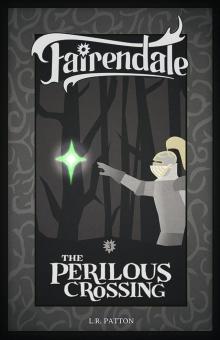 The Perilous Crossing
The Perilous Crossing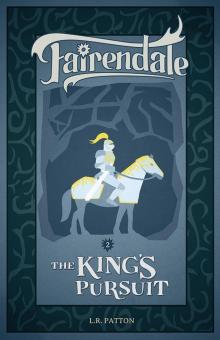 The King's Pursuit
The King's Pursuit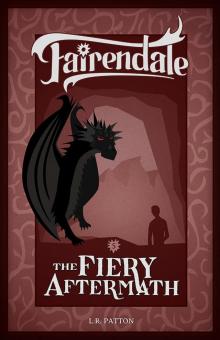 The Fiery Aftermath
The Fiery Aftermath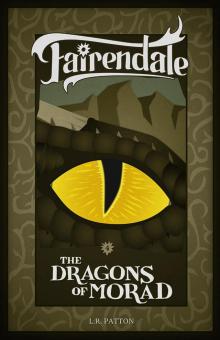 The Dragons of Morad
The Dragons of Morad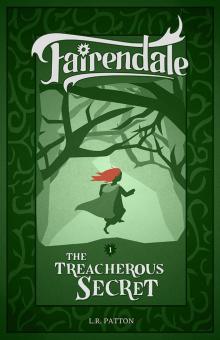 The Treacherous Secret
The Treacherous Secret